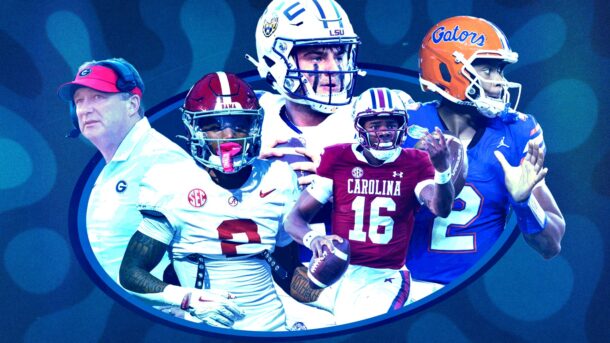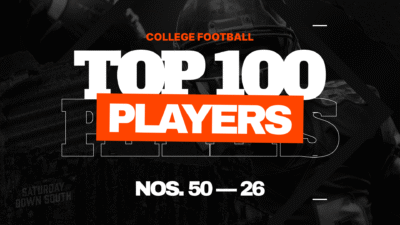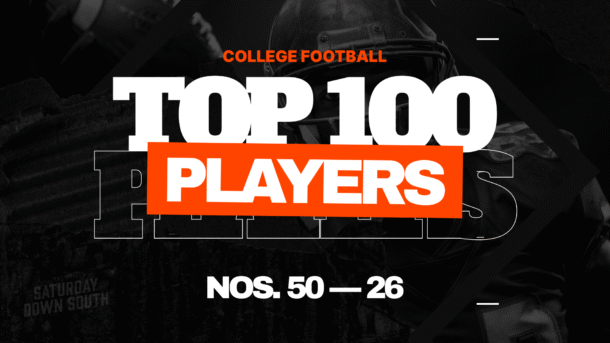
Alabama coach Nick Saban arrived in Atlanta for Thurday’s college football awards show in a helicopter.
Before settling into his seat to see his players rack up hardware, he answered several questions about the team’s 2015 season:
Nick, when you hired Lane Kiffin a year ago, what were you hoping he would add to your offense?
COACH SABAN: We had a tremendous amount of respect for Lane from having played against him and watching his offensive teams play in the past. We were hopeful that he would be able to add a new dimension from an energy and enthusiasm standpoint. And we knew that a year ago we were going to have a different kind of quarterback, and we were going to have to adapt some things. We felt like he was the kind of guy that could be able to adapt our offensive team to the players that we had.
So we’re very different offensively this year than we were a year ago, and it’s because he has shown an ability to adapt to the players that we have, and I think that’s really been the key to us having the success that we’ve had.
Nick, for Jarran Reed, what kind of emotional leader is he for this team?
COACH SABAN: Jarran Reed has done an outstanding job of providing leadership for the younger players on our team by the example that he sets, the energy and enthusiasm that he plays with. And Jarran’s come a long way in our program in the last couple years and certainly had a great year for us and has done a lot to influence the other players on our team and our entire front which has been one of the strengths of our team.
Coach Saban, since you left Michigan State it’s been rehashed often and as recently as a couple weeks ago that you said when you left Michigan State you left in part because, no matter what you did, Michigan was always going to be No. 1, if not Michigan or Notre Dame or Ohio State. I realize it was a long time ago. Can you clear up once and for all whether you said anything like that upon leaving Michigan State, whether you felt that way, and with the perspective you have now from the outside looking in, where do you think Michigan State matches up?
COACH SABAN: First of all, I don’t recall making a statement like that. But I think Mark has done a fantastic job there. They’ve won three Big Ten Championships. They have an opportunity to win a National Championship this year. So I’ve had nothing but respect for Michigan State all my life. I spent ten years there. I had a lot of friends there that still are good friends. I almost feel like in some ways it’s a part of my home for the time we spent there and the relationships that we’re able to build.
I have nothing but positive things to say about Michigan State and the great program that they have now and the accomplishments that they have.
Can I ask all three coaches who had a loss this year, that first practice after the first loss of the season, may I ask maybe what the message was? And maybe when you looked at your team that day, what did you know going forward was still possible by the way they attacked that practice moving forward?
COACH STOOPS: Left to right? You’re out, Dabo, so…
You know what I noticed immediately? As much energy as any practice we’ve ever had, and it was from the start of stretch. When we broke to go to individual, guys had all kinds of energy. You could tell there was a determination that they were going to do something about it. I can’t say when you go out for that first practice that you know you’re going to end at this point, but there was a determination to improve.
THE MODERATOR: Coach Saban?
COACH SABAN: The first thing I asked our players after the game was how are you going to respond to a loss? It’s a real true test of your character, not only as a competitor and a football player but also as a man to how you respond when things don’t go well for you, and the players responded extremely well. And we didn’t do anything different in the next practice, but I do think the players were much more – had much more intensity, were much more interested in what they could do to try to improve and get better, and that’s probably one of the things that helped us finish the season the way we did.
COACH DANTONIO: We’ve always talked a lot about how you handle success and how you handle failure, so it was a message that was sent. This is about an opportunity to grow as well. Young people are resilient in so many different ways. I think the coaches handled the loss a little worse probably than the players did, but it was about getting back on our feet.
We knew we controlled our own situation by who we were playing in the near future at that point in time. So we just sort of made a statement and continued on. I think after you do have a loss or after something bad happens to you, it’s how you respond to that that defines people. So we talked a lot about that and tried to make that happen.
Nick, I know you’re not a big fan of questions that look back at things that happened 20 years ago. But do you remember at all what put Mark on your radar leading up to when you hired him as an assistant or what are some of the memories you have of his development as a coach while working on that stuff?
COACH SABAN: I remember Mark when he played at Zanesville High School. I was the coach that recruited that area and he went to South Carolina. I think sometimes when you meet people, like I’ve known Bobby’s family ever since I was 25 years old, recruiting Youngstown. His dad was a great defensive coordinator at Cardinal Mooney and Uncle Bob who was a coach at South High School.
So when you kind of know these people and you develop relationships with them, you never forget them. Mark coached at Kansas with Glen Mason who I coached with at Ohio State and done a really good job. I thought we were fortunate to be able to hire him and he did a fantastic job for us in the five years that we were there.
I always thought he’d do great if he ever got an opportunity to be a head coach. He’s certainly done a lot better job at Michigan State than I ever could do. So he’s done really well. I’m proud of him.
In terms of coming out of the game on Saturday where a lot of the rhetoric was stay in the moment, not letting it get too big, and not trying to repeat the same mistakes last year during this time. Do you feel that’s more on the players or did you feel you needed to address that more and more with the team?
COACH SABAN: I think everyone in the organization would say that they didn’t think they did as good a job as we needed to do because we didn’t feel like we played great against a really, really good Ohio State team who won the National Championship. I think it was our first time to go to a bowl game that was really a playoff game. So maybe that experience will now help us a little bit in the future be able to do a little better job with our players.
It’s really my responsibility and all of us in the organization who affect the players to try to get them to play as well as they can play in a game. I think if you don’t feel that your team plays great, you always feel like you need to do a better job as a coach, and that’s certainly how we felt last year after this game.
Nick, what’s the schedule like for you guys during the course of the next few weeks leading up to the game? I’m not sure if you’ve started looking at film yet of Michigan State, but what are your early impressions of the challenges that they pose? Along the same lines for Mark, what do you know about Alabama at this point and just what they do?
COACH DANTONIO: I’ve taken every opportunity to watch film in the midst of this recruiting. What I knew about Alabama first of all is what Nick has done there because he was hired really at the same time that I was hired at Michigan State. So I’ve sort of seen him take Alabama back to a championship-type level, obviously. When I watch their football team, I see guys play with great technique. I watch their corners, their balance, I watch how firm their defensive line is. I watch their running back. I watch their offensive line. I see great precision. I see great technique, and I see guys playing together.
I don’t know all the names yet, but I will. I know numbers, and some of those numbers are big numbers.
With that being said, we’ve got guys too on our football team that knows how to win, and right now that’s what we’ve been able to do. We’ve won a lot of football games, so quite sure we’ll come to play.
COACH SABAN: Our focus has mostly been on recruiting. But while you’re recruiting and flying around on the plane you do watch the other teams that you’re going to play. One thing I did see after the Florida game on Saturday was I got home just in time to watch Michigan State go 22 plays in 9 minutes and something and score a touchdown. That told me probably as much as I needed to know about that team in terms of the grit that they had, the kind of competitive spirit they had, how they believed in one another and how they thought they could win the game. And the fact they’ve won several games this year late in games by making big plays tells you a lot about the confidence of a team and how they compete in a game.
So they’re a very physical team. They run the ball, play really good defense. So this is going to be a really challenging game for us. We’re going to have 7 practices before Christmas break, and we’ll come back and start up in Dallas and have a regular week so our players had finals week this week, so we’re basically we just did a couple workouts trying to keep them in a little bit of shape.
Nick, obviously Bob and Mark could speak to this because they’ve all had extensive time in Ohio. How, Nick, did the State of Ohio shape your coaching career?
COACH SABAN: Well, I guess I learned how to recruit in the State of Ohio because that was my recruiting area northeast Ohio was my recruiting area for many, many years. Played at Kent State. Had a great mentor and coach in Don James who was a fantastic coach and really cared a lot about his players and shaped my philosophy to this day of trying to help players be more successful in life for having been involved in your program. I started out there, so I think my roots were all there.
Some of the relationships that I developed early in my coaching career certainly were all certainly in that area and I learned a tremendous amount from some of the great mentors that I had. I’ve been very fortunate. George Perles was the first person at Michigan State to give me the responsibility of being a defensive coordinator. Was involved in rebuilding the program and going to the Rose Bowl there, and that was a great learning experience for me because he had been with Chuck Noll for 11 years and really knew how to win, knew how to handle people and had a great defensive philosophy and certainly helped shape mine.
Then to be able to work for Bill Belichick in Cleveland for four years and knowing a lot of people in Cleveland, that was a great learning experience for me. But because of all the roots that I had from all the time that I coached, Bill was constantly trying to keep the press out so they couldn’t see practice. So he’d put them in a little box somewhere in a corner where they wouldn’t want to stand. And Linda, who is my secretary now, was Bill’s secretary, and I would give her a list of 40 high school coaches all over northeast Ohio who were my buddies that I grew up with and a lot of them were from Youngstown, and they’d get the A-passes, so they’d be right on the sidelines and be able to watch practice.
Then Art would come out and chew Bill’s butt out because he’s saying who are all these guys over here. They have the good passes and I want the media to get the good passes and they’re over there where they can’t see. And Belichick would turn around and look at me and say, you see why I’m getting chewed out? Because of you.
So I’ve always really valued our profession and the people in it, because my high school coach probably affected me as much as anybody, other than my parents, in terms of the things I learned around the coaches and mentors that I had when I was a young player and my college coach Don James.
So these relationships that we have in northeast Ohio have lived on and on and on, and some of them have become great friends and it’s because of a coaching profession and the respect that I have for coaches, these guys included.
To see Mark right here with you and see how far he’s come, what does that mean to you?
COACH SABAN: We have several guys that have worked for us in the past that have done extremely well in this profession, and it always makes you – makes me very happy to see people who did a great job for us when we were together and worked hard, because they had goals and aspirations that they wanted to accomplish and achieve, and that’s why they did a great job for you. To see them go on and do that is something that makes me feel proud and very happy for Mark and his family, also Michigan State because he’s done a fantastic job there. So there is always a good feeling that goes with that.
An itinerant journalist, Christopher has moved between states 11 times in seven years. Formally an injury-prone Division I 800-meter specialist, he now wanders the Rockies in search of high peaks.







